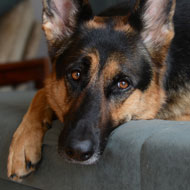
Booklet shows points of concern in category two and three breeds
The Kennel Club has released an illustrated guide to help show judges to identify physical features that could lead to health and welfare issues in dogs.
It forms part of the club’s Breed Watch programme, which aims to highlight ‘points of concern’ in specific breeds.
The guide includes illustrations and information to demonstrate how exaggerated conformation can impact dog health in category two and three breeds. It also shows which conditions should be penalised in the show ring.
Areas covered include respiratory issues and the muzzle, nose, nostrils, eyes, skin, weight and body condition, as well as tail formation, general conformation and soundness.
Category two breeds have listed points of concern, while category three have visible conditions or exaggerations that cause pain or discomfort. Judges examining these breeds are required to complete health monitoring forms after every appointment at shows.
According to the Kennel Club, the new booklet will also help breeders, exhibitors and owners to assess the health of their dogs.
The news comes just ahead of this year’s Crufts, which starts tomorrow (8 March). Previous events have prompted concerns about the health of dogs in the show ring, including a German shepherd who won ‘best of breed’ in 2016, despite having a sloping back and apparent walking difficulties.
Frank Kane, chairman of the Breed Standards and Conformation Sub-Group, said: “The show ring is, and must remain, a force for improving dog health.
"Judges and the veterinarians who perform vet checks at Kennel Club licensed shows have an important role to play when assessing category two and three breeds, because their judgement about whether there are any visible signs of health concerns will help to move these breeds forward.
“This guide shows the visual points of concern and how they relate to health in a very clear and concise way, and will help these individuals to keep health to the forefront of their minds.
“If the best and healthiest dogs are winning at dogs shows, even if these account for a very small percentage of the overall dog population, this can help to influence how dogs are bred and what is seen as desirable outside of the show ring, producing a wider positive impact on dog health.”
A copy of the guide has been sent to all breed health co-ordinators of category two and three breeds and can be downloaded for free with a judge’s Kennel Club Academy subscription. Alternatively, a copy can be purchased from the club’s online shop for £10.



 The Veterinary Medicines Directorate (VMD) is inviting applications from veterinary students to attend a one-week extramural studies (EMS) placement in July 2026.
The Veterinary Medicines Directorate (VMD) is inviting applications from veterinary students to attend a one-week extramural studies (EMS) placement in July 2026.